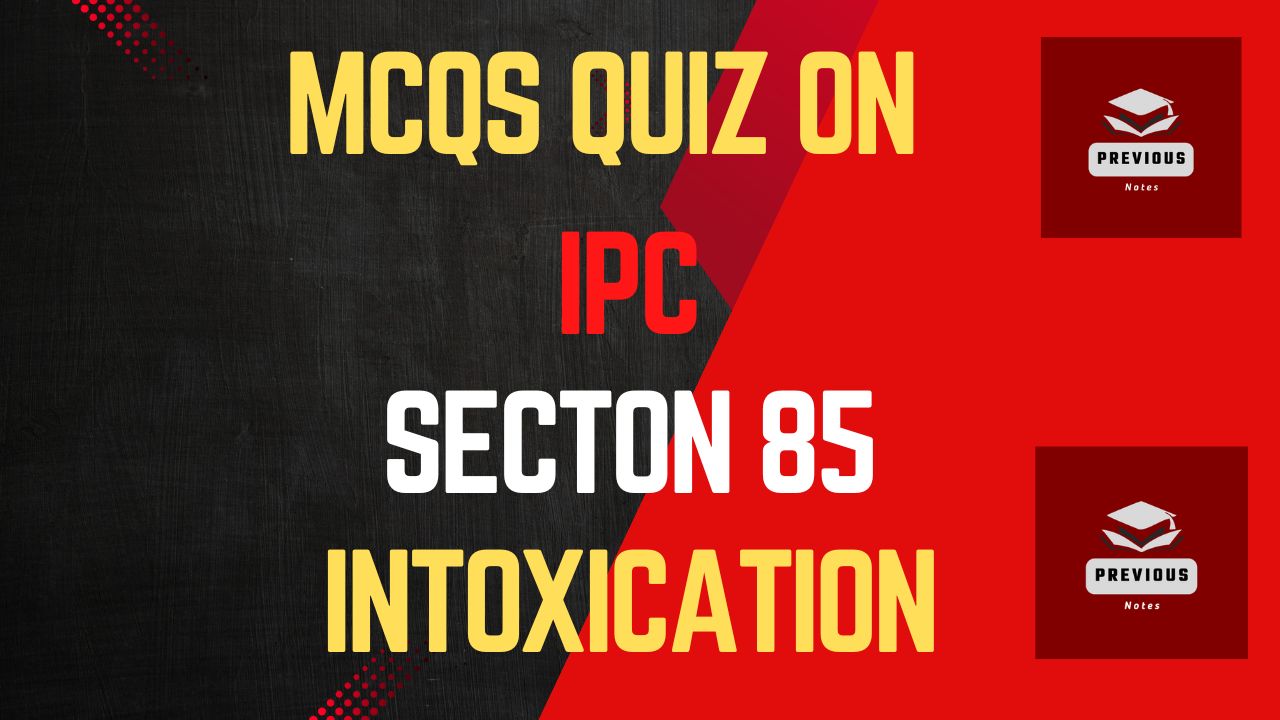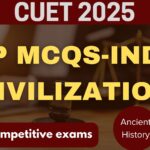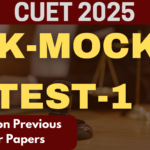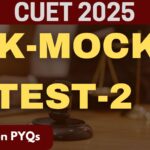Practice IPC MCQs Quiz for Free: Section 85 | Intoxication
IPC MCQ Quiz Topic-Intoxication
IPC MCQs Quiz on Section 84
Question
Your answer:
Correct answer:
Your Answers
Important MCQs
- Consider the following statements:
The accused at the time of committing the act because of intoxication, which was administered to him without his knowledge or against his will, is incapable of knowing:
- the nature of the act
- that the act is wrong or contrary to Law
- that the act is immoral or wrong
- that the act is of the nature which may be ignored
To claim the benefit of Section 85 of IPC, which of the above need to be proved?
- A) 2 and 4
- B) 1 and 4
- C) 1 and 3
- D) 1 and 2
Correct Answer: 1 and 2
- Which of the following is not correct?
- A) The intoxication, in order to be available as defence must be of that degree and extent as renders the accused practically an automation
- B) A person made non compos mentis by illness is exempted from criminal liability, if the act was committed under the influence of his mental disorder
- C) Except murder and offences punishable with death, compulsion is an excusable defence, if the act is done under the fear of instant death
- D) Voluntary drunkenness is an excuse for knowledge
Correct Answer: Voluntary drunkenness is an excuse for knowledge
- Intoxication is an excusable defense to criminal liability if it is:
- A) administered without the knowledge of the offender
- B) administered against the will of the offender
- C) Both
- D) None
Correct Answer: Both
- Which of the following is leading case on intoxication?
- A) Barrow v. Issacs
- B) None
- C) Director of Public Prosecution v. Beard
- D) Nathulal v. State of M.P.
Correct Answer: Director of Public Prosecution v. Beard
- In which of the following cases the principles relating to the defence of intoxication were laid down?
- A) Director of Public Prosecution v. Beard
- B) McNaughten Case
- C) R. v. Prince
- D) R. v. Dudley and Stephen
Correct Answer: Director of Public Prosecution v. Beard
- Which one of the following is not correct in case of defence of intoxication?
- A) Intoxication is a defence when the intoxicated person is incapable of knowing what he was doing was either wrong or contrary to law.
- B) Defence of intoxication is available both in case of involuntary and voluntary intoxication.
- C) Particular intention and knowledge is attributed to the accused who has acted under involuntary intoxication.
- D) Intoxication is a defence when the intoxicated person is incapable of knowing the nature of the act at the time of doing it.
Correct Answer: Defence of intoxication is available both in case of involuntary and voluntary intoxication.
- For a defence of intoxication, to escape criminal liability, the intoxication:
- A) can be self-administered
- B) administered against his will or knowledge
- C) none of the above
- D) should not be self-administered
Correct Answer: administered against his will or knowledge
- Which Section of the Indian Penal Code deals with the defence of involuntary Intoxication?
- A) Section 87
- B) Section 84
- C) Section 85
- D) Section 86
Correct Answer: Section 85
- Which one of the following cases is related to the defence on the ground of intoxication?
- A) R v. Limpan
- B) Veed Meneze v. Yusuf Khan
- C) A V. Director of Public Prosecution
- D) Director of Public Prosecution v. Beard
Correct Answer: Director of Public Prosecution v. Beard
- Which section of Indian Penal Code deals with voluntary intoxication?
- A) Section 85
- B) Section 87
- C) Section 84
- D) Section 86
Correct Answer: Section 85
- Which one of the following cases does not relate to intoxication?
- A) R. v. McNaughten
- B) D.P.P. v. Beard
- C) R. v. Tandy
- D) Basudeo v. State of Pepsu
Correct Answer: R. v. McNaughten
- Basudev v. State of Pepsu, AIR 1956 SC is a leading case on:
- A) Insanity
- B) All of these
- C) Intoxication
- D) Infancy
Correct Answer: Intoxication
- A person who commits an offence in a state of voluntary intoxication shall be liable to be dealt with as if he had:
- A) the same knowledge as he would have had if he had not been intoxicated
- B) the same intention as he would have had if he had not been intoxicated
- C) the same intention and knowledge as he would have had if he had not been intoxicated.
- D) not the same intention and knowledge as he would have had if he had not been intoxicated
Correct Answer: the same intention and knowledge as he would have had if he had not been intoxicated.
Practice IPC MCQs Quiz for Free: Section 81 | Necessity
IPC MCQ Quiz Topic-Intoxication
IPC MCQs Quiz on Section 84
Question
Your answer:
Correct answer:
Your Answers
You May Also Like:
Indian Penal Code MCQs Quiz: Section 1 to 5
Indian Panel Code MCQs Quiz on Section 511 and Attempt
IPC MCQs Quiz on Sec. 76 and Sec. 79 | Quiz on Mistake
Practice IPC MCQs online for free (Section 78)
Practice IPC MCQs Quiz for free | Section 81 MCQs | Necessity
Practice IPC MCQs online for free : Infancy (section 82-83)
Practice IPC MCQs Quiz for free | Section 81 MCQs | Necessity
Practice IPC MCQs Quiz for free | Section 84 MCQs | Insanity
DOMESTIC VIOLENCE AS TORT | APPLICATION OF TORT LAW
Economic Tort | Business Tort: Application of Tort Law
Difference between intention and motive | In Tabular Format
Bolam Test | Bolam V. Friern Hospital Committee | Medical Negligence
Jacob Mathew V. State of Punjab Case Law | Medical Negligence
Medical Negligence in tort | Case Laws
Contributory Negligence | Law of Tort | Case Laws
Specific Principles of Criminal Law | LLM Previous Year Paper 2024 | CCSU
Specific Torts | LLM 4th Semester Previous Year Paper 2024 | CCSU
History and Basic Principles of Criminal Law | Previous Paper 2023
LLM Previous Year Paper 2023 | PRIVILEGED CLASS DEVIANCE
PENOLOGY PREVIOUS YEAR PAPER | LLM | CCSU
LLB Previous Year Paper 2023 | Constitutional Law II | CCSU
LLB Previous Year Paper 2023 | Legal and Constitutional History | CCSU
LLB Previous Year Paper 2023 | Jurisprudence II | CCSU
LLB Hindu Law Previous Year Paper 2023 | CCSU
LLB Hindu Law Previous Year Paper 2024| CCSU
Euthanasia in India, Right to die with Dignity
Right to Privacy Case Law Mr. X vs. Hospital Z
Federal Constitution Definition and key points
University of Madras vs. Shantabai,1954: Article 12 Case Law
Article 20 Fundamental Right with Case Laws
Article 19 Fundamental Right of Indian Constitution with 10 Case Laws
Article 358, 359 Fundamental rights during emergency
Parliamentary Privileges and Fundamental Rights with Case Laws
Article 14 Fundamental Right with Case Laws
Article 15 Fundamental Right with Case Laws
Article 12 Fundamental Right with Case Laws
DOMESTIC VIOLENCE AS TORT | APPLICATION OF TORT LAW
Crimes without Mens Rea? Statute without Mens Rea.
Definition of crime by various jurists, Criminology
Methods of Studying Criminology
All about Capital Punishment with Case Laws
IMPOSSIBLE ATTEMPT | ATTEMPT VS IMPOSSIBLE ATTEMPT
Difference between Preparation and Attempt
Tests to Determine Attempt and preparation | With Case Laws
Difference between intention and motive | In Tabular Format
Forms of Judicial Process: Adversarial & Inquisitorial
Crimes without Mens Rea? Statute without Mens Rea.


















Leave a Reply